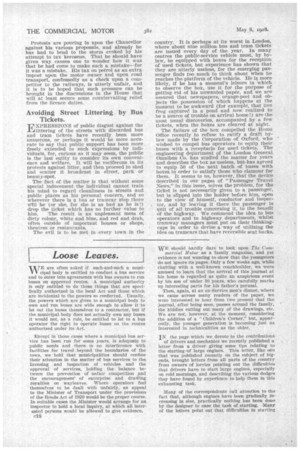Avoiding Street Littering by Bus Tickets.
Page 46

If you've noticed an error in this article please click here to report it so we can fix it.
EXPRESSIOS of public disgust against the
-11.14 :NT littering of the streets with discarded bus and tram tickets have recently been more numerous, or perhaps it would be more accurate to say that public support has been more freely extended to such expressions by individuals, for, curious as it may seem, the public is the last entity to consider its own convenience and welfare. It will be vociferous in its protests against litter, and then proceed to shed and scatter it broadcast in street, park or beauty-spot.
The fact of the matter is that without some special inducement the individual cannot train his mind to regard cleanliness in streets and public places as his personal concern, Fuld SO wherever there is a bus or tramcar stop there Will he (or she, for she is as bad as he is !) drop the ticket which has no further value to
him. The result is an unpleasant mess of dirty colour, white and blue, and red and drab, often outside of important houses or shops, theatres or restaurants. The evil is to be met in every town in the country. It is perhaps at its worst in London, where .about nine million bus and tram tickets are issued every day of the year. In many centres the public-service vehicle must, by bylaw, be equipped with boxes for the reception of used tickets, but experience has shown that • they are utterly useless, for the emerging passenger finds too much to think about when he reaches the platform of the vehicle. He is more likely, if he has a moment's leisure in Which to observe the box, use it for the purpose of getting rid of his unwanted paper, and we are assured that newspapers, orange-peel and objects the possession of which happens at the moment to be awkward (for example, that live frog captured in a pond and now realized to be a source of trouble on arrival home!) are the most usual discoveries, accompanied by a few tickets, when the boxes are cleared at night. The failure of the box compelled the Home Office recently to refuse to ratify a draft bylaw made by the Corporation of Oxford, who wished to compel bus operators to 'equip their buses with a 'receptacle for used tickets. The engineering department of the London General Omnibus Co. has studied the matter for years and describes the box as useless, but has agreed to equip 50 of the next batch of buses with boxes in order to satisfy those who clamour for them. It seems to us, however, that the device described in our' pages of "Passenger Travel News," in this issue, solves the problem, for the ticket is not necessarily given to a. passenger, but is slipped into the holder before him, open to the view of himself, conductor and inspector, and by leaving it therethe passenger is quit of all trouble concerning it, to the benefit of the highway. We commend the idea to bus operators aad to highway departments, whilst tramway managers must put on their thinkingcaps in order to devise a way of utilizing the idea on tramcars that have reversible seat hacks.
























































































































